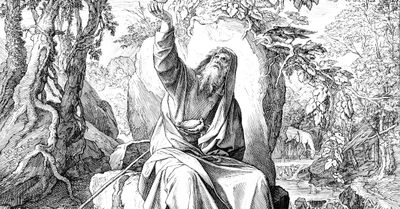This discussion requires a bit of maturity. We don’t want a conversation about whether Enoch belongs in the Bible to cause people to question their Bible. It is God’s word. It is inspired. It is infallible. It is authoritative. The good news is that this discussion does not call into question the Bible you hold in your hands and take to church every Sunday. In fact, this discussion confirms that Bible. You see, the book of Enoch confirms what is in the other books of the Bible, and it expands on some of that content. Most importantly, it does NOT contradict anything in your Bible. So, a discussion over the nature of the book of Enoch is a safe conversation. It’s not going to cause you to question your Bible.
Let’s start off this discussion with a description of the category of literature that the book of Enoch is most often placed in. This category is called the pseudepigrapha. You may be familiar with the word “pseudo.” For example, “Pseudo-science” is not real science or pure science. It has things in common with science or has the appearance of science, but it has qualities that make it not science. The term “pseudo” is an ancient Greek word that means “false.” So, anything prefaced by “pseudo” is not genuine. “Epigrapha” is the Greek term for “writings.” So, pseudepigrapha are false writings. This moniker does not mean that their contant is entirely false. It usually means that the author is false. In most cases, it was written by a nobody and then attributed to a famous person. In the case of the book of Enoch, some scholars have concluded that it is not truly the work of Enoch, but a first century nobody who put Enoch’s name on it.
Now let me tell you why I think it is probably not a pseudo writing, but, it is, in fact, genuine. The answer, quite simply, is the content. I’ve read the entire account of Enoch. I did not come across a single verse that would contradict anything I believe as a Bible-believing Christian. It expanded on what I knew. As it relates to the Angel Conspiracy, it expands greatly on what Moses says about the sons of god, the daughters of men, and the Nephilim in Genesis six. You might ask, “Well, if Moses wanted us to know more details about the activity of the fallen angels, then why did he not just tell us himself?” The answer is obvious: the details of the story were so well known by everyone because of Enoch’s version of it, that all Moses had to do was make reference to it. It would have been redundant of him to go back over the details that had been so well described by Enoch.
If the account of Enoch had such qualities as to endear itself, then why did the men who assembled the Bible reject it? Because it is an Old Testament writing, let’s begin with the Jews. Why did they reject it? The Jews rejected it for a very specific reason: Enoch’s descriptions of the “son of man” could too easily be applied to the person of Jesus Christ. In other words, they were afraid that Enoch’s descriptions of the messiah would lead people to believe in Jesus Christ as the messiah. Having rejected Jesus, they chose to leave the account of Enoch out of their canon.
The men who assembled the New Testament rejected it for a simple reason: the Jews had rejected it! The inertia of its rejected at the Jewish level could not be overpowered at the Christian level.
Despite these official decisions, the account of Enoch was widely known—and accepted—in the ancient Judeo-Christian world. Scholars and commoners alike knew it and believed it, and there was one region that did include it in their Bible. It was the ancient Ethiopian church. In fact, the two best copies we have of Enoch were found in Ethiopian Bibles. Unfortunately, these copies were not in the original Hebrew but in the Ethiopian language. Fragments of Enoch in the Hebrew were found among the Dead Sea Scrolls, and Enoch is quoted extensively by the early church fathers and apologists. This proves that it was read and studied by the ancient Christians.
On one level, this discussion seems a bit irrelevant, doesn’t it? When it comes to canonicity, well, that ship has already sailed. That train has already left the station. So, why bring it up now. I believe strongly that God allowed the book to be hidden for over 1500 years for a reason. You see, Enoch states very clearly that his primary audience is not the people of his day, or even a day near his own. His primary audience is the people of the eschaton, the people of the End Times. I believe that God has allowed Enoch to rise from obscurity in these times because its message is for us. We are drawing close to the end, and we need to hear what Enoch has to say.

